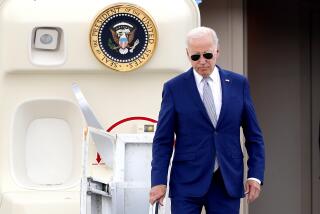Region Awaits a Revived Clinton
- Share via
Asia, like Bill Clinton, did well last week. For the American people did more than put up a stop sign in front of a Republican Party recklessly eager to impeach the U.S. president. With nationwide election results that were anything but a resounding Republican endorsement, Americans resuscitated their president’s ability to play the role of world leader.
As Clinton heads for Asia this weekend on a long-planned trip, he will find a region scarcely at ease. Territorial disputes simmer below the surface. Tensions in Indonesia and Malaysia have Singapore’s nerves on edge. India’s nuclear ploy has left the subcontinent in tumult for, in a sense, nuclear proliferation is the most poisonous kind of globalization. Although Clinton’s itinerary excludes the Indian subcontinent, Asia will take as much of the politically reborn Clinton as it can get.
As the Korea Herald editorialized last week: “By skirting the danger of being forced out of office, Clinton will be able to restore his leadership. This will be an encouraging development for many countries that rely on U.S. leadership to tackle numerous global problems, including the sweeping financial crisis.” Singapore’s Business Times wrote: “The American voters have shown maturity in refusing to give the Republicans the green light they needed to continue focusing the entire nation’s attention on the sex and political scandal that has dominated Washington for months on end.”
The first overseas test of Clinton’s new muscle won’t be long in coming. Later this week in Malaysia, the leaders of the Asia-Pacific Economic Cooperation (APEC) organization convene for their sixth annual head-of-state summit. They will be watching Clinton navigate in a country where former Deputy Prime Minister and Finance Minister Anwar Ibrahim, champion of good relations with the West, stands trial for various (trumped up) charges. And where the man who threw him in jail, Prime Minister Mahathir Mohamad, has erected a new economic iron curtain to ward off globalization. Clinton might have spurned the high-profile APEC get-together altogether. Fortunately, he didn’t--just as in June he rightly ignored congressional pressures to cancel his trip to China because of its treatment of political dissidents.
The Anwar controversy aside, serious trade quarrels may erupt at APEC. Japan is raising new objections to the reduction of some trade barriers in economic sectors it sees as vulnerable to foreign competition. That controversy may follow Clinton to his next stop, Tokyo, where he will find the Japanese establishment, despite the polite veneer, unnerved and introspective.
In a recent speech to a foreign-affairs group in Wyoming, Japanese embassy press spokesman Kazuo Kodama painted a candid picture of a society in the midst of reassessment: “It is clear in retrospect that Japan made mistakes. It failed to brace for the coming waves of globalization in which market forces play a deciding role in the international competition of goods and services, especially financial ones. There is no denying that while others were working hard to prepare for the coming winter, Japan was basking in the glory of what we thought was a never-ending summer.”
Clinton should find the conversation a little more convivial in South Korea, his next stop after Tokyo.
Seoul is further along on the self-examination road than Japan. President Kim Dae Jung is a convert to the inevitability of the forces now raging across borders--a process he terms “universal globalism.” Narrow nationalism is outmoded and parochial protectionism is suicidal, he says: “Even the smallest Korean rural village will have to compete with farmers across the globe. A small factory in a back alley in Korea will have to engage in competition with the same types of plants in every corner of the world.” Kim has called for an end to the buy-Korean-only nonsense that has typified emotional Korean nationalism at its most parochial. When has any leader of Korea ever spoken so plainly to his countrymen?
A strong U.S. presidency is a necessary element of world stability as economic systems undergo these huge shifts. Last week’s election results helped revive the White House in a way that could prove vital to key allies like Korea and Japan. It’s also important to non-allies like China, which benefits from a president with the strength to lead public opinion in support of Sino-American engagement, and India, whose nuclear test program scotched a planned Clinton trip there. But as Clinton’s decisions to visit Malaysia this weekend and China last June attest, much can be gained when the president himself shows up to wave the American flag. And in India, no less than in China, engagement will produce more than isolation. Clinton would cap his Asia trip in triumph if he were to add New Delhi to his itinerary in a dramatic last-minute gesture.
More to Read
Get the L.A. Times Politics newsletter
Deeply reported insights into legislation, politics and policy from Sacramento, Washington and beyond. In your inbox twice per week.
You may occasionally receive promotional content from the Los Angeles Times.










